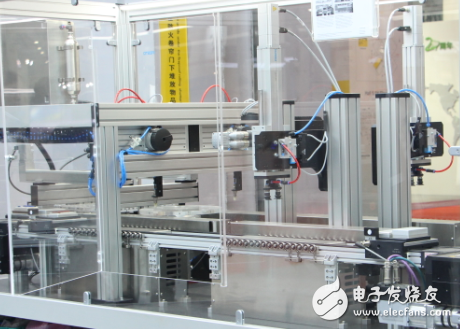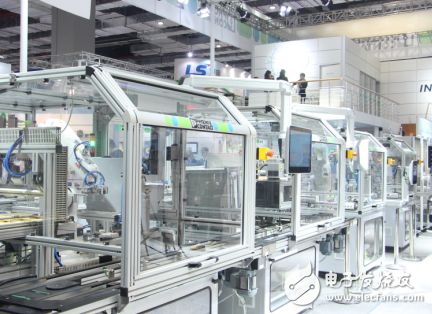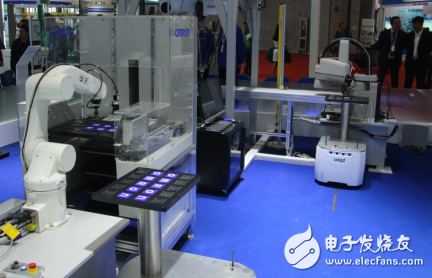With the popularization of automation technology, coupled with the rapid rise of the Internet of Things and artificial intelligence technology, there have been some new changes in the global manufacturing industry. Traditional manufacturing based on human labor is shifting to a machine-led, intelligent production model shift. In the industrial sector, companies are investigating more efficient manufacturing methods, hoping to increase productivity through emerging technologies while further reducing production costs and inventory risks.
The trend of rising human resources and materials continues, the competition in the market has become more and more fierce, many manufacturers have lost their lives because of the cost beyond control; the problem of global aging has become more and more serious, and the improvement of living standards has made the younger generation have higher In pursuit, it is difficult for the factory to recruit workers who are willing to engage in low-end work. The individualized demand is becoming more and more obvious. If the manufacturer still adheres to the traditional method of mass production and distribution, it may turn the product into waste at any time because of the customer's demand. At times, competitors are taking the market with faster product iterations.
So, what is the key to the development of modern manufacturing? The answer is lean manufacturing, whether it is the use of machines instead of human resources, or the distance between managers and equipment by the Internet of Things, or the analysis of machine efficiency and productivity through artificial intelligence. The aim is to achieve the effect of lean production. Modern factories are forced to achieve zero waste, high efficiency, and fast response in order to maximize the benefits of manufacturing systems while meeting rapidly changing market demands.
 What is lean production?
What is lean production? Lean manufacturing or lean manufacturing refers to a systematic approach to maintaining efficiency and reducing waste during manufacturing. This model was originally derived from Toyota's elimination of waste and inefficient production operations. After MIT's organization of multinational experts in the United States, it took five years, costing $5 million, and theoretically summed up an optimal production. Organizational systems and methods. This model has been developed successfully and then used to produce around the world.
Zero defect and zero inventory is the ideal state of modern manufacturing. Lean production runs through the entire manufacturing process from product design, production, marketing and operation, greatly improving cycle time, productivity, cost and waste utilization, all of which Will result in lower costs and a higher competitive position.

In the lean manufacturing process, manufacturers must understand what features customers are willing to pay for, what they are not willing to pay, some customers are willing to sell for high quality, some customers are not, manufacturers need to accurately meet the needs of users.
A reliable process is a powerful guarantee of consistent delivery, which can be wasteful in the event of a process failure. At the same time, manufacturers need to assess the value of various links such as materials, processes, equipment, and product production to find out which ones can be eliminated and which ones need to be enhanced. Through zero inventory and instant manufacturing, product production can be brought close to the time required by customers, which can solve the production waste associated with inventory, transportation and flow.
The importance of machine substitutionWith the development of manufacturing transformation and upgrading, due to the repetitive, speed, accuracy and flexibility of robots, the use of lean manufacturing is increasing. Automation equipment, including robots, is rapidly becoming a core component of lean manufacturing and low-cost manufacturing, while industrial robots have become the backbone of all sizes.
Robots have proven to be a significant tool for improving the return on manufacturing investment, but robots must be properly integrated into the lean manufacturing environment to achieve the desired results. An example of a robot that helps achieve lean manufacturing is a material handling robot that can set up multiple tasks and perform material handling between other tasks. In addition, robots rarely have downtime, such as shifts, breaks, etc.

Some boring, dirty, and dangerous tasks, such as quick pressing of unloading parts or welding metal, are not suitable for human workers. Robots can free people from these areas, while robots can help companies reduce the risk of injury or death. Many manufacturing environments are harmful to people and can lead to higher insurance and worker compensation costs.
Challenging taskManufacturers seeking lean manufacturing and lean management systems are key to future growth, while lean production is easy to understand, but it is often the most challenging because it requires new perspectives and management procedures to achieve a complete value stream.
The realization of lean production in the factory requires the introduction of a model to reduce manufacturing costs, optimize the process of producing materials and products, plan and expand the workstation, and design a risk management system. Lean thinking can establish consensus with the cooperative company in the service, process and distribution channels, and achieve better cooperation to complete the overall production efficiency.
A well-designed line can improve the lean environment of the manufacturer. Robots can do their jobs quickly and accurately, something that humans can't do. There are not many manufacturing solutions that can reduce waste as much as robots. There is no doubt that robots can increase the competitiveness of manufacturers.
Our company specializes in the production and sales of all kinds of terminals, copper terminals, nose wire ears, cold pressed terminals, copper joints, but also according to customer requirements for customization and production, our raw materials are produced and sold by ourselves, we have their own raw materials processing plant, high purity T2 copper, quality and quantity, come to me to order it!
Cable Terminals
Taixing Longyi Terminals Co.,Ltd. , https://www.lycopperterminals.com